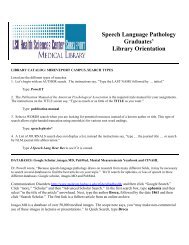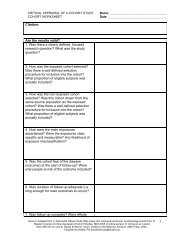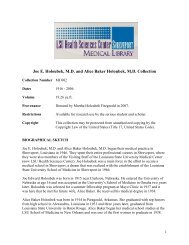Evidence-Based Medicine Resources - Duke University Medical ...
Evidence-Based Medicine Resources - Duke University Medical ...
Evidence-Based Medicine Resources - Duke University Medical ...
You also want an ePaper? Increase the reach of your titles
YUMPU automatically turns print PDFs into web optimized ePapers that Google loves.
COMMON TYPES OF QUESTIONS:<br />
Therapy -- how to select treatments to offer patients that do more good<br />
than harm and that are worth the efforts and costs of using them<br />
Diagnostic Test -- how to select and interpret diagnostic tests, in order to<br />
confirm or exclude a diagnosis, based on considering their specificity,<br />
sensitivity, likelihood ratios, expense, safety, etc.<br />
Prognosis -- how to estimate the patient's likely clinical course over time<br />
and anticipate likely complications of disease<br />
Harm/Etiology -- how to identify causes for disease (including iatrogenic<br />
forms)<br />
Prevention -- how to reduce the chance of disease by identifying and<br />
modifying risk factors and how to diagnose early by screening<br />
Cost-Analysis -- how to compare the cost and consequences of different<br />
treatments and tests<br />
Type of Study Suggested best type of Study<br />
Therapy RCT (Randomized Controlled Trial)<br />
Diagnosis Test prospective, blind comparison to a gold standard<br />
Prognosis cohort study > case control > case series<br />
Etiology/Harm RCT> cohort > case control > case series<br />
Prevention RCT > cohort study > case control<br />
Cost-analysis economic analysis<br />
Note: Questions of therapy and prevention, which can best be answered by<br />
an RCT, can also be answered by a meta-analysis or systematic review.<br />
TYPES OF STUDY DESIGNS:<br />
A Meta-analysis takes a systematic review one step further by<br />
combining all the results using accepted statistical methodology.<br />
Systematic Reviews usually focuses on a specific clinical question and<br />
conducts an extensive literature search to identify studies with sound<br />
methodology. The studies are reviewed, assessed, and the results<br />
summarized according to the predetermined criteria of the review<br />
question.<br />
Randomized, controlled clinical trials. A prospective, analytical,<br />
experimental study using primary data generated in the clinical<br />
environment. Individuals similar at the beginning are randomly allocated<br />
to two or more groups (treatment and control) and the outcomes of the<br />
groups are compared after sufficient follow-up time.<br />
A study that shows the efficacy of a diagnostic test is called a<br />
prospective, blind comparison to a gold standard study. This is a<br />
controlled trial that looks at patients with varying degrees of an illness and<br />
administers both diagnostic tests -- the test under investigation and the<br />
"gold standard" test -- to all of the patients in the study.<br />
Cohort studies identify a large population who already has a specific<br />
exposure or treatment, follows them over time (prospective), and<br />
compares outcomes with another group that has not been affected by the<br />
exposure or treatment being studied. Cohort studies are observational and<br />
not as reliable as randomized controlled studies, since the two groups may<br />
differ in ways other than in the variable under study.<br />
Case control studies are studies in which patients who already have a<br />
specific condition or outcome are compared with people who do not.<br />
Researchers look back in time (retrospective) to identify possible<br />
exposures. They often rely on medical records and patient recall for data<br />
collection. These types of studies are often less reliable than randomized<br />
controlled trials and cohort studies because showing a statistical<br />
relationship does not mean than one factor necessarily caused the other.<br />
Case series and Case reports consist of collections of reports on the<br />
treatment of individual patients or a report on a single patient. Because<br />
they are reports of cases and use no control groups with which to<br />
compare outcomes, they have no statistical validity.<br />
<strong>Duke</strong> <strong>University</strong> <strong>Medical</strong> Center Library | December 2005









